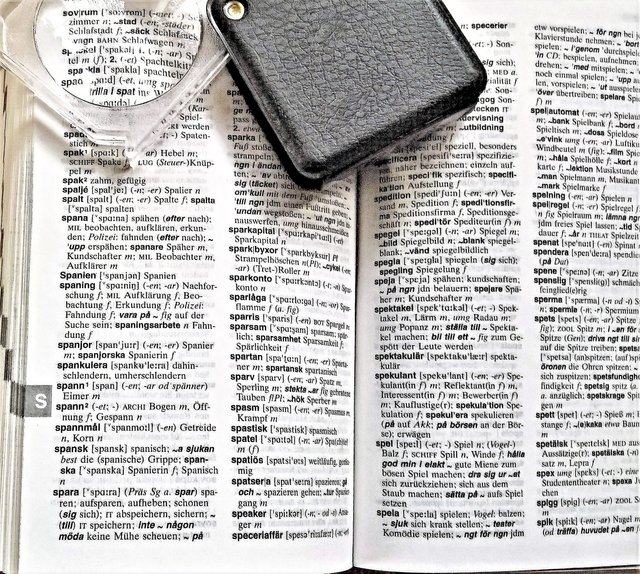Bilingual Children - Development
Since I moved to Thailand almost four years ago I have met lots of Thai-Western couples with kids. It came as a surprise to me that most of those lovely people have never given any thought to how their children's language would develop in their multilingual homes. As a consequence, some of the kids have never benefited from growing up in a linguistically diverse environment and ended up being monolingual, with a rather poor grasp of the second language. In this series of posts I would like to have a closer look at how bilingualism is formed in children and hopefully offer some practical advice to people who plan to have bilingual children.
I would like to emphasise that my post concerns children who are exposed to two languages since their infancy. I am aware of the fact that some people think that providing bilingual input for their babies will do them more harm than good. Those concerns can be put into three categories: development, bilingual code-mixing, communicative competence. I will try to dispel false notions regarding those topics and provide arguments supporting my claims.
Development
Phonological Development
One of the myths regarding bilingual children is that they start speaking later than babies who have only been exposed to one language. Apparently, bilingual babies' brains need to process more input, hence the delayed initiation of speech production. As multiple research shows (e.g. De Houwer, 1990; Paradis & Genesee, 1996; Yip & Matthews, 2000), this is not the case at all. Bilingual babies start to speak at approximately the same age as monolingual babies. The studies show neither delay nor acceleration when it comes to basic milestones in language development.
Interestingly, babies exposed to two languages develop perception of two phonetic systems. In the TEDx presentation below you can take a closer look at a research done with children from English-Spanish and English-English parents and their abilities to hear sounds from two phonetic systems. It goes without saying that this skill might take a significant amount of time to be developed among adults and hardly ever results in a native-like phonetic performance of the second language.
Lexical Development
When it comes to lexical development, studies show that bilingual children tend to have lower score on vocabulary tests than monolingual children (Genesee & Nicoladis, 1995; Pearson et al., 1993). However, the same scholars prove that conceptual vocabulary of bilingual children (that is their combined vocabulary in both languages without translation equivalents) is the same as the conceptual vocabulary of monolingual children. There are several reasons explaining worse results of single language vocabulary tests. First, either bilingual and monolingual children have limited long-term memory but those exposed to two languages have to acquire vocabulary from both languages. Then, the amount of exposure to each language of bilingual children is lower than that of monolingual children. Finally, the context for acquiring two languages among bilingual children is probably more limited than the context for absorbing only one language among monolingual children.
Bilingual children's vocabulary will develop along with their exposure to the two languages they speak. To my mind, operating in two lexical systems gives the children an opportunity of deeper understanding of the world around them and concepts they are taught. How many times have you found yourself lost in translation when trying to transfer an idea from one language to another, just to find out that it doesn't really exist there? Bilingual children are not constrained by those limitations and their perception of the world seems to be freer and more thorough.
Morpho-syntactic Development
Similarly to phonological development, bilingual children develop morphological and syntactic skills for both languages they absorb.
Paradis and Genesee (1996), for example, found that 2–3 year-old French–English bilingual children: (1) used finite verb forms earlier in French than in English; (2) used subject pronouns in French exclusively with finite verbs but subject pronouns in English with both finite and non-finite verbs, in accordance with the status of subject pronouns in French as clitics (or agreement markers); and (3) placed verbal negatives after lexical verbs in French (e.g. ‘n’aime pas’) but before lexical verbs in English (‘do not like’). These patterns characterize the performance of monolingual children acquiring these languages.
Childhood Bilingualism. Research On Infancy Through School Age.
Even though bilingual children may temporarily transfer some morphological or syntactic elements from one language to the other, in the long run they develop appropriate target language forms.
Above mentioned arguments show unbelievable plasticity of bilingual children’s brain and dispel most of the criticism associated with acquiring two languages simultaneously. If you are interested in more aspects regarding bilingual children, please stay tuned for my next post.
Earworm
Pictures: https://pixabay.com


One of my cousins grew up in a Thai speaking family, had Burmese people as nannies and been studying in an international school. She speaks perfect 3 languages... No harm learing 3 languages here. She's a normal little girl :)
No doubt she is normal, she must be very smart, too! What happens with children like that, according to linguists, is in their early years their vocabulary range in each particular language is smaller than monolingual children's in that particular language. However, if you count the words of the bilinguals (or trilinguals ;)) in all languages they speak it equals the monolinguals' vocab range! It can, of course, be compensated for when they are a bit older.
I used the one parent one language method from birth for my daughter who is 7 years old now. She gets Thai from Mom and French from me. She gets English from school, cartoons and games. She is more advanced in English and it looks like her mother tongue is English, perfect prononciation. She is catching up with Thai now, at first she sounded like a Farang speaking Thai! French is weaker because I can't compete with the amount of hours she is exposed in the 2 other languages. A 2 hours per week lesson at the Allience Francaise is correcting this. The vocabulary she has is different for all 3 languages.
This is fascinating and it must be very rewarding to be a parent of a polyglot child!
You inspired me to write a post about this today: https://steemit.com/education/@gmichelbkk/raising-a-trilingual-child